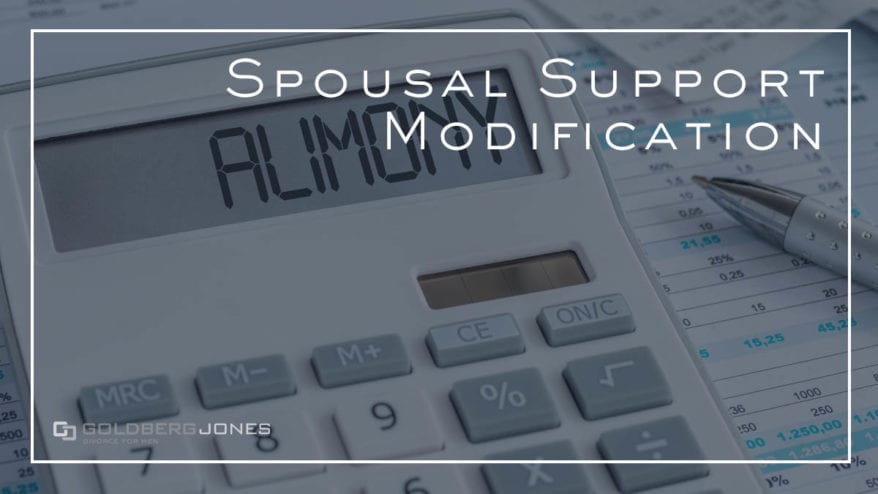In the wake of divorce, you face many expenses. Ending your marriage may be the absolute right choice, but it rarely comes easy or cheap. One of the biggest continuing costs many men encounter is spousal support.
Spousal support (also called spousal maintenance or alimony), is designed to provide the lower-income spouse with money for living expenses regardless of gender.
Can I Get a Modification After the Divorce Decree?
If spousal support was ordered as part of the Divorce Decree or Judgment, either party may have the right to seek Spousal Support Modification so long as the award was not deemed non-modifiable originally.
Who can request a spousal support modification?
The receiving ex-spouse can seek an adjustment if the payer’s income has risen substantially.
Conversely, the payer may be able to seek to reduce or terminate spousal support if the ex-spouse has remarried or achieved financial independence.
Like many court orders, once in place, these payments become difficult to alter. But a new law just took effect in Oregon that may have a huge impact on spousal support modifications.
Spousal Support Modification Law Changes
It’s traditionally been no easy task to modify spousal support. Up to now, it usually involved a lengthy proceeding where one party showed that the other’s financial status significantly changed. This was a detailed process that often required meetings, hearings, and a whole mess of time and money.
What is Senate Bill 492?
On January 1, 2018, however, Senate Bill 492 took effect in Oregon. Prior to this law coming into play, if you wanted to show that your ex’s financial state significantly improved, you had to actually file for modification in order to request financial discovery to see if was even an option.
SB 492 provides a post-judgment, out-of-court process for parties subject to a spousal support award to exchange financial documents.
Under the new legislation, you can request your ex’s significant financial information without going through such a lengthy process. You can only do this once every two years, though you’re also required to submit your own financial documents.
Still, this substantially redefines the method for attempting spousal support modification. It may prove faster, more efficient, and more cost-effective. You no longer have to file a court case before you know if you even have a chance.
Potential Positives:
-
-
- This could reduce litigation since you no longer have to file a court case to gain access to this information.
- This should reduce litigation costs since you will be better able to determine your options and the legitimacy of your case ahead of time.
- So, no costly filing with a weak claim or hiring an attorney.
- It becomes easier to keep tabs on your ex’s changing financial status by requiring verification on a regular basis. Every two years under this law.
-
Potential Negatives:
-
-
- With the current lack of information and precedent, it’s unclear exactly how the courts will enforce this new law.
- You may still require legal assistance in order to get the other party to comply.
- The requesting party must disclose their finances first.
- Rather than a good faith belief that there is a change in financial circumstance, ex’s may be able to use this to harass a former spouse.
- It’s easy for you to use, but it’s also just as easy for the opposing party.
-
This is just a quick take on how SB 492 may very well have an impact on how spousal support modification in Oregon works moving forward. Right now, there are many hypotheticals.
How exactly it takes shape, how courts interpret the regulation, and how it’s employed will become clear over time. And as with most new regulations, it has potential benefits as well as potential drawbacks.
Still, this is something to keep in mind moving forward. It presents a number of intriguing possibilities and ideally reduces some of the headaches and exertion associated with spousal support modification in Oregon.
Update: How Spousal Support Is Now Taxed:
Spousal support tax deduction abolished.
Beginning January 1, 2019, on new court orders that include spousal support provisions, the party paying spousal support is no longer be able to deduct this amount.
At the same time, the recipient no longer has to pay taxes on this amount. Before, the opposite was true. This can impact the way people negotiate divorce settlements.
This change will also effect any modification to a pre-existing court order.
However, this large change in spousal support taxation policy does not apply to existing divorce orders (those entered prior to January 1, 2019). These orders, so long as not later modified, will be grandfathered in at the prior tax policy.
Related Reading: Property Division And Unexpected Divorce Assets
Other Reading: Breaking Down Divorce Rates By Generation
